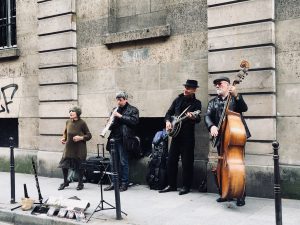How to Become a Better Musician


The role of a musician requires the ability to collaborate with many people. A musician may not be the biggest diva, but they will often be the brightest light in the room. They may have developed their negotiation skills through their art, or they may have natural talents for it.
Empathy
Empathy is a vital skill for musicians. However, it may not always come naturally to everyone. While some people are more emotionally responsive than others, the ability to empathize can help you learn to understand others and understand their struggles. It’s also important to differentiate empathy from pity, sympathy, and compassion.
Empathy can help you listen to other people’s music better. A recent study shows that it can enhance the quality of music listening. People with high empathy engage their social circuitry more during music listening than people with low empathy. These people also enjoy music more and activate their reward system. Empathy is also linked to greater creativity.
One musician who has developed empathy in his work is Bashi Rose. Bashi is a musician, theater artist, and filmmaker. He helped to establish the experimental Konjur Collective. He has also developed a DRAMA program, which brings theater to prisons to promote empathy and communication. In addition to his musical work, Bashi is passionate about using the drum kit as a creative tool for healing.
Curiosity
Musicians have an incredible thirst for knowledge and experimentation. They love to explore new concepts and try out instruments that may be unfamiliar to them. Their curiosity can lead to unexpected and exciting results. Ultimately, curiosity is the key to becoming a successful musician. So what are some ways to develop curiosity?
One study revealed that people who listen to violent music tend to have higher levels of morbid curiosity. Morbid curiosity is an interest in unusual or potentially dangerous phenomena. It is an adaptive trait that helps humans explore dangerous parts of life and regulate their emotions. Researchers found that students with higher levels of morbid curiosity were likelier to listen to more music with violent themes. This difference was still significant after accounting for their technical proficiency and musical understanding.
The study also found that musicians are generally more open to experience. This openness helps young musicians develop their expressive scope and creative faculties. As a result, educators should aim to recruit students with this openness to the arts.
Imagination
There are several different types of imagination. The first type, propositional imagination, is the process by which a person represents something to himself or herself in his or her mind. The second type, objectual imagination, involves representing a physical entity or situation. Both kinds are characterized by a strong creative drive and a keen ability to visualize the future.
Differently, imagination can be considered a characteristic of a musician. According to Scruton and Levinson, the best way to explain musical expressiveness is by considering how people imagine. This means that musical understanding requires imaginative perception. However, this kind of reasoning has its critics, such as Peter Kivy and Stephen Davies.
Confidence
The key to building your confidence as a musician is to practice. This practice can help you overcome feelings of isolation that affect your confidence. It can also help you develop a comfort level in front of an audience. If you cannot play in front of an audience, try practicing at home or with family and friends. This can help you feel comfortable in front of a large crowd.
Performing on stage and sharing your passion can be a nerve-wracking experience. But the more confident you are, the more opportunities you will have and the more money you’ll make. Also, if you have confidence in yourself, you won’t dwell on any mistakes you might make. Ultimately, this will make you a better musician and allow you to flourish.
Openness to experience
Openness to experience is a trait that has been linked with musical talent. Researchers have shown that individuals with openness to experience are more likely to excel at music than those without it. This trait predicts the duration of a music training program, and it was more powerful than IQ in explaining the duration of musical training.
It is also associated with creativity and originality, two of the most important attributes of musical ability. The trait of openness is most closely related to an artistic experience, creativity, and spontaneity. The study also found a strong correlation between openness to experience and music preference. For example, ‘openness’ was more strongly associated with classical, jazz, and sad music.
